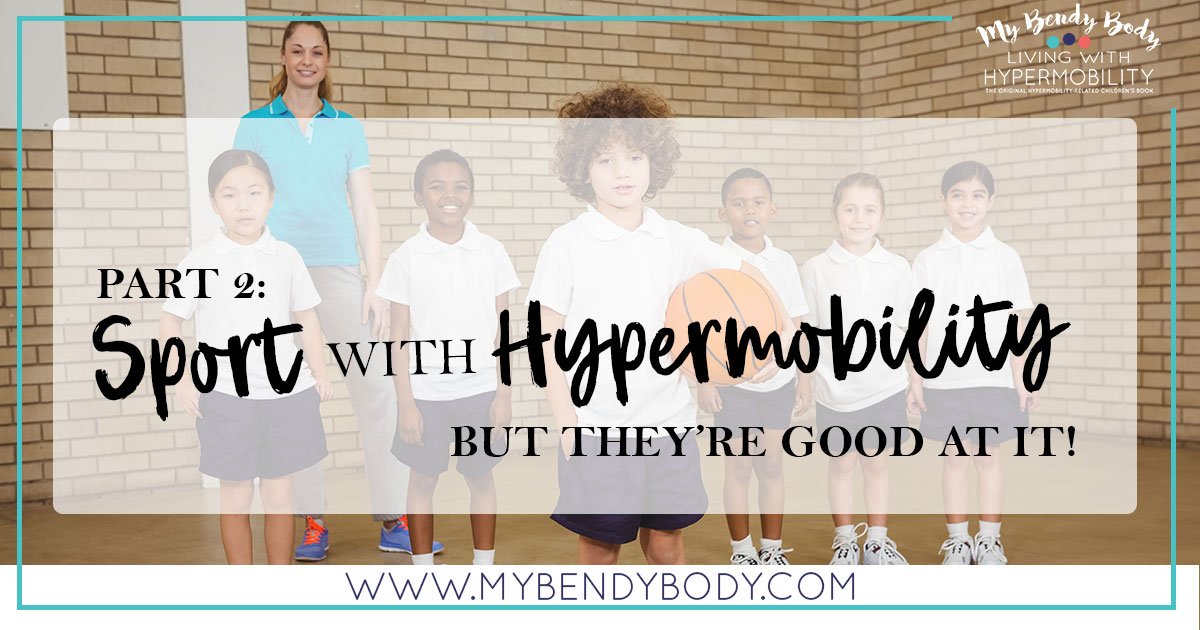Part 2: Sport with hypermobility - But they're good at it!
Part 2: My child has hypermobility, and they're good at sport. Can they still play?
Following on from Part 1: Sport with Hypermobility (if you missed it you can catch it here) are some more thoughts on this important topic.
4. Some words of advice (from me & my mum)
Just because your child is really good at a particular sport doesn't mean that it's good for them. Sure, psychologically it may be good for them to be good at something, to excel at something, there is no doubting that. A large percentage of hypermobile children will actually be really athletic and be one of the best in their chosen sport.
However, this needs to be seriously weighed against the damage that it can potentially or will likely do to their bodies in the long run.
Having had more orthopaedic surgeries before the age of 30 than I have fingers, I'm a living example of this.
In primary school I was in the advanced swimming squad - I swam like a fish from a very young age. When I was 6 or 7, I was chosen to participate in the elite gymnastics program to train for the Olympics because I was obviously very flexible and had great coordination for little tot. All through primary school I played top grade netball, I played tennis, and did Little Athletics.
I was good at all these things largely because I was hypermobile, I had lots of fast twitch muscle fibres and I had good coordination skills. Sure, they were all good for my confidence and my self-esteem, and I really enjoyed them.
"Taking them away from me" which is how I saw it as a child, did me far more psychological damage than not ever doing them in the first place could have caused. If I could go back to childhood, knowing what I do now about my body and the state it's in after more than a dozen surgeries, I would seriously consider which physical activities I pursued. If I had to choose, swimming would probably have been the safest and the more enduring, for me.
If I had the chance to go back, I would choose to not play all those other sports that I loved in favour of a body that doesn't have sutures and pins and other foreign objects holding it together. I would choose safe sports over what I was the best at, and I would choose balanced participation. I would also find other things to be good at and to foster my skills in other areas of my life.
The sports I did well were terrible for my body.
The most obvious was the Olympic training for gymnastics. Could you imagine what state I'd be in if I'd gone through with that? (Mothers intuition saved me from that one, but boy did I resent it for about, I don't know, the whole of my adolescence [but I did get to a point of acceptance and gratefulness that it was the way the planets aligned]). As it played out, I had to quit normal, run of the mill, once per week gymnastics when I was about 9 or 10 because of injuries. I was forced to quit netball at age 13 after knee surgery. I quit tennis before the age of 14 after my shoulders started dislocating. The only thing I managed to keep doing for fitness for some years was swimming... But even now, 4 shoulder surgeries and 3 bulging cervical spine discs down the road, I can't do that.
I can still walk (not for exercise), most days, and for that I'm grateful.
If we flog a hypermobile body, it usually breaks down. There seems to be a point at which the hypermobile body can no longer tolerate the stress and strain of repetitive physical activity or increased load/expectations. Any single one of those sports had the power to do that to me, to break me down, and they did...
And it has the power to do that to your child too if isn't the right match for their body, their skills and limitations.
I do have to say, to my parents credit, they had no idea I was hypermobile. I wasn't officially diagnosed until I was 23.
They often say, "if only we knew…” They would never have allowed me to do all of those things if they knew it was going to hurt me.
Your child’s (early) diagnosis is an advantage.
Promise me something?
Before you enrol your child in a sport, check it over with someone who understands hypermobility and knows your child's body and the potential damage that could occur. Don't be like my parents and live with the regrets (even though they had no way of knowing any better).
Your child can beg you until they are blue in the face about a particular sport, but you have to remember that they are a child; a child who doesn't understand that they are stuck with the same body for their 80+ years on earth (God-willing).
Even if they're good at sport, if it's going to hurt them, you have to be the grown up and make the difficult decision to say no.
Don't forget to check out Part 3 in this series on Sport & Hypermobility
